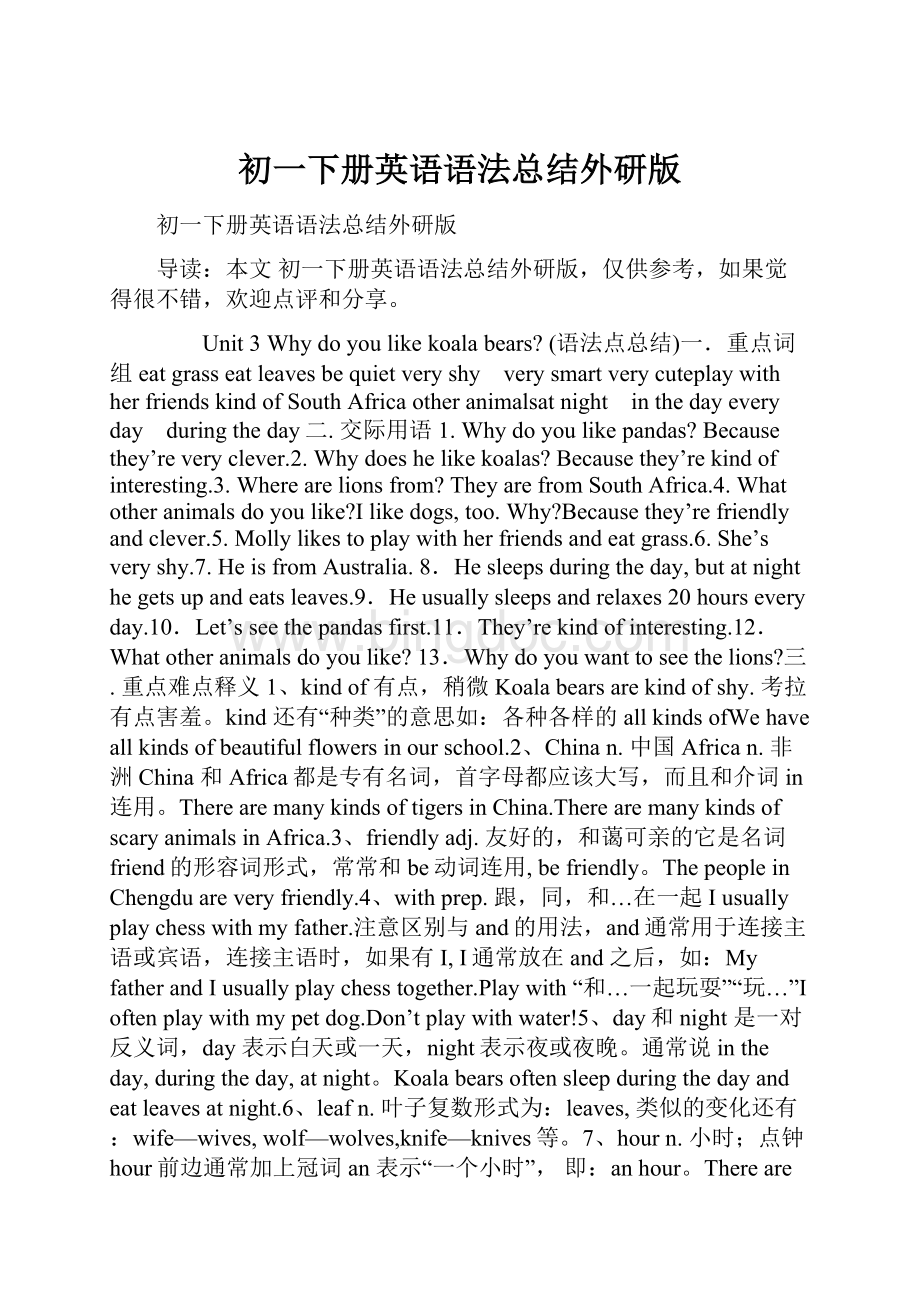初一下册英语语法总结外研版.docx
《初一下册英语语法总结外研版.docx》由会员分享,可在线阅读,更多相关《初一下册英语语法总结外研版.docx(6页珍藏版)》请在冰点文库上搜索。

初一下册英语语法总结外研版
初一下册英语语法总结外研版
导读:
本文初一下册英语语法总结外研版,仅供参考,如果觉得很不错,欢迎点评和分享。
Unit3Whydoyoulikekoalabears?
(语法点总结)一.重点词组eatgrasseatleavesbequietveryshy verysmartverycuteplaywithherfriendskindofSouthAfricaotheranimalsatnight inthedayeveryday duringtheday二.交际用语1.Whydoyoulikepandas?
Becausethey’reveryclever.2.Whydoeshelikekoalas?
Becausethey’rekindofinteresting.3.Wherearelionsfrom?
TheyarefromSouthAfrica.4.Whatotheranimalsdoyoulike?
Ilikedogs,too.Why?
Becausethey’refriendlyandclever.5.Mollylikestoplaywithherfriendsandeatgrass.6.She’sveryshy.7.HeisfromAustralia.8.Hesleepsduringtheday,butatnighthegetsupandeatsleaves.9.Heusuallysleepsandrelaxes20hourseveryday.10.Let’sseethepandasfirst.11.They’rekindofinteresting.12.Whatotheranimalsdoyoulike?
13.Whydoyouwanttoseethelions?
三.重点难点释义1、kindof有点,稍微Koalabearsarekindofshy.考拉有点害羞。
kind还有“种类”的意思如:
各种各样的allkindsofWehaveallkindsofbeautifulflowersinourschool.2、Chinan.中国African.非洲China和Africa都是专有名词,首字母都应该大写,而且和介词in连用。
TherearemanykindsoftigersinChina.TherearemanykindsofscaryanimalsinAfrica.3、friendlyadj.友好的,和蔼可亲的它是名词friend的形容词形式,常常和be动词连用,befriendly。
ThepeopleinChengduareveryfriendly.4、withprep.跟,同,和…在一起Iusuallyplaychesswithmyfather.注意区别与and的用法,and通常用于连接主语或宾语,连接主语时,如果有I,I通常放在and之后,如:
MyfatherandIusuallyplaychesstogether.Playwith“和…一起玩耍”“玩…”Ioftenplaywithmypetdog.Don’tplaywithwater!
5、day和night是一对反义词,day表示白天或一天,night表示夜或夜晚。
通常说intheday,duringtheday,atnight。
Koalabearsoftensleepduringthedayandeatleavesatnight.6、leafn.叶子复数形式为:
leaves,类似的变化还有:
wife—wives,wolf—wolves,knife—knives等。
7、hourn.小时;点钟hour前边通常加上冠词an表示“一个小时”,即:
anhour。
Thereare24hoursinadayand60minutesinanhour.8、befrom来自…befrom=comefromPandasarefromChina.=PandascomeformChina.9、meatn.(食用的)肉,为不可数名词,表示“许多”时,使用much来修饰,即:
muchmeatHeeatsmuchmeateveryday.10、grassn.草,为不可数名词,表示“许多”时,使用much来修饰,即:
muchgrass。
Thereismuchgrassontheplayground.四.语法知识特殊疑问句通常以“what”、“who”、“which”、“when”、“where”、“how”、“howold”、“howmany”等开头,对某一具体问题进行提问。
特殊疑问句的基本构成有两种情况:
1.疑问句+一般疑问句结构。
这是最常见的情况。
例如:
What’syourgrandfather’stelephonenumber?
你爷爷的电话号码是多少?
Whoisthatboywithbigeyes?
那个大眼睛的男孩是谁?
Whichseasondoyoulikebest?
你最喜欢哪个季节?
Whenishegoingtoplaythepiano?
他什么时候弹钢琴?
Wheredoeshelive?
他住在哪儿?
Howareyou?
你好吗?
Howoldareyou?
你多大了?
Howmanybrothersandsistersdoyouhave?
你有几个兄弟姐妹?
2.疑问句+陈述句结构。
这时疑问词作主语或修饰主语。
例如:
Whoisondutytoday?
今天谁值日?
Whichmanisyourteacher?
哪位男士是你的老师?
我们学过的What/Howabout+名词/代词+其他?
也是特殊疑问句,它是一种省略结构。
例如:
IlikeEnglish.What/Howaboutyou?
我喜欢英语。
你呢?
Whataboutplayingbasketball?
打篮球怎么样?
Unit3Whydoyoulikekoalas?
(短语句型汇总)一、词组wanttodosth.想要做某事wantsbtodosth想要某做某事wantsth想要某物Letsbdosth让某人做某事kindof有几分\种类akindof一种……yearsold…年龄 如:
tenyearsold十岁liketodosth喜欢做某事likedoingsthplaywith… 与...一起玩bequiet安静duringtheday在白天atnight在夜间havealookat..看...one…theother一个...另一个...二、句型
(1)、-whydoyoulikepandas?
你为什么喜欢熊猫?
-Becausethey’reverycure.因为它们很可爱。
(2)、-Whydosehelikekoalas?
他为什么喜欢树袋熊?
-Becausetheyarekindofinteresting.因为她们有点有趣。
(3)、-Wherearelionsfrom?
狮子来自何处?
-TheyarefromSouthAfrica.她们来自南非。
(4)、-Whatanimalsdoyoulike?
你喜欢什么动物?
-Ilikeelephants.我喜欢大象。
三、日常交际用语
(1)、-Let’sseethelions.咱们看狮子吧。
(2)-Whydoyouwanttoseethelions?
你为什么想看狮子?
-Becausetheyareverycute.因为它们很可爱。
(3)-Doyoulikegiraffes?
你喜欢长颈鹿吗?
Yes,Ido./No,Idon’t是的,我喜欢。
/不,我不喜欢。
(4)-Whatotheranimaldoyoulike?
你还喜欢其他什么动物?
_Ilikedogs.Too我也喜欢狗。
other+名词的复数.表示没有特定的数量范围theother+名词的复数表示有特定的数量范围.(5)-Whyareyoulookingatme?
你为什么看着我?
-Becauseyouareverycute.因你很可爱。
(6)-Letusplaygames.–Great!
咱们玩游戏吧。
--太棒了。
Letmesee.让我看看。
Unit4Iwanttobeanactor.(语法点总结)一.短语:
1wanttodosth想要作某事2givesbsth=givesthtosb给某人某物/把某物给某人3helpsbdosth帮助某人作某事Eg:
Iwanttohelpmymotherdosomehouseworkathome.4helpsbwithsth帮助某人谋事Eg:
Iwanttohelpmymotherwithsomehouseworkathome5intheday在白天6atnight在晚上7talkwith/tosb和----谈话8bebusydoingsth忙于做某事Eg:
Heisbusylisteningtotheteacher.9inahospital在医院l10work/studyhard努力工作11EveningNewspaper晚报二.重点句式及注意事项:
1询问职业的特殊疑问词是what;有三种主要句式①What+is/are+sb?
②What+does/do+sb+do?
③What+is/are+名词所有格/形容词性物主代词+job?
2Peoplegivemetheirmoneyorgettheirmoneyfromme.3SometimesIworkinthedayandsometimesatnight.4Iliketalkingtopeople.5Iworklate.I’mverybusywhenpeoplegoouttodinners.6Wheredoesyoursisterwork?
7thenwehaveajobforyouasawaiter.8Doyouwanttoworkforamagazine?
Thencomeandworkforusasareporter.9Doyouliketoworkeveningsandweekends?
10Weareaninternationalschoolforchildrenof5-12.三.本单元中的名词复数。
1policeman---policemen2womandoctor-----womendoctors3thief-----thievesUnit4Iwanttobeanactor.(短语句型汇总)一、词组wanttobe+职业想要成为。
。
。
shopassistant 店员bankclerk银行职员workwith与。
。
。
一起工作workhard努力工作workfor为。
。
。
而工作workas作为。
。
而工作get..from…从。
。
。
获得。
。
。
givesth.to.sb/give.sb.sth把某物给某人正确的表示:
giveit/themtosb.错误的表示:
givesb.it/themintheday在白天atnight在夜间talkto/with与…讲话goouttodinners外出吃饭inahospital在医院newspaperreporter 报社记者movieactor电影演员二、句型
(1)-Whatdo/does+某人+do?
某人是做什么的?
例:
-Whatdoyoudo?
-I’mastudent.你是做什么的?
--我是一个学生。
-Whatdosehedo?
He’sateacher.他是干什么的?
--他是一个学生。
(2)-Whatdo/does+某人+wanttobe?
某人想当什么?
例:
Whatdoyouwanttobe?
-Iwanttobeateacher.你想当什么?
--我相当老师。
-Whatdoesshewanttobe?
Shewanttobeanurse.她相当什么?
--她相当护士。
(3)-Wheredoesyoursisterwork?
你姐姐在什么地方工作?
-Sheworksinahospital.她在医院工作。
(4)-Doesheworkinthehospital?
他在医院工作吗?
Yes.hedoes。
/No,hedoesn’t是的,他在。
/不,他不在。
(5)-Doessheworklate?
-Yes,shedoes/No.shedoesn’t(6)-英语中询问职业的几种表达方式:
Whatdo/does…do?
Whatis…?
Whatisyourfather?
What’sone’sjob?
例:
What’syourfather’sjob?
Unit5I’mwatchingTV(语法点总结)一.现在进行时Ⅰ现在进行时的用法表示现在(说话瞬间)正在进行或发生的动作Ⅱ现在进行时时间状语及标志性词①now现在②atthistime在这时③atthemoment现在④look看(后面有明显的“!
”)⑤listen听(后面有明显的“!
”)Ⅲ现在分词的构成①一般在动词结尾处加ingEg:
go—goinglook--looking②以不发音字母e结尾的动词,去e加ing。
Eg:
write—writingclose--closing③以重读闭音节结尾的动词,如果末尾只有一个辅音字母,应先双写这个字母,再加ing.Eg:
get—gettingrun—running(swim,run,put,get,sit,begin)Ⅳ现在进行时的构成肯定句:
主语+am/is/are+doing+其他+时状.Eg:
Heisdoinghishomeworknow.否定句:
主语+am/is/are+not+doing+其他+时状.Eg:
Heisnotdoinghishomeworknow.一般疑问句:
Am/Is/Are+主语+doing+其他+时状?
Eg:
Ishedoinghishomeworknow?
肯定回答:
Yes,主语+am/is/areEgYes,heis.否定回答:
No,主语+amnot/isn’t/aren’tEg:
No,heisn’t.二.短语:
1.doone’shomework做某人的作业dohousework做家务2.talkonthephone在电话里交谈,讲电话talkabout…… 谈论……talkto(with)sb和某人交谈3.writealetter写信writealettertosb给某人写信4.playwith……和……一起玩5.watchTV 看电视TVshow电视节目6.waitforsb/sth等待某人/某物7.someof…………中的一些8.inthefirstphoto在第一张照片里(介词用in,序数词前面有the)inthelastphoto在最后一张照片里aphotoofone’sfamily某人的家庭照片9.atthemall在购物街at/inthelibrary在图书室at/inthepool在游泳池10.readabook=readbooks=dosomereading看书\阅读11.thanksfor=thankyoufor 为某事而感谢(后接动词要用v-ing)三.重点句式及注意事项:
1.他正在干什么?
Whatishedoing?
他正在吃饭。
Heiseatingdinner.他正在哪里吃饭?
Whereisheeatingdinner?
他正在家里吃饭。
Heiseatingdinnerathome.2.你想什么时候去?
Whendoyouwanttogo?
让我们六点钟去吧。
Let’sgoatsixo’clock.3.他正在等什么?
Whatishewaitingfor?
他正在等公交车。
Heiswaitingforabus.4.他们正在和谁说话?
Whoaretheytalkingwith?
他们正在和MissWu说话。
TheyaretalkingwithMissWu.5.你们正在谈论什么?
Whatareyoutalkingabout?
我们正在谈论天气。
Wearetalkingabouttheweather.6.他们都正在去上学。
Theyareallgoingtoschool.7. 这儿是一些我的照片。
Herearesomeofmyphotos.这儿是一些肉。
Hereissomeofmeat. (someofmeat不可数,故用is)8. 谢谢你帮我买这本书。
Thankyouforhelpingmebuythisbook.9. family家;家庭。
强调“整体”,是单数;强调“成员”时,是复数。
Hisfamilyhasashower.他们家有一个淋浴。
HisfamilyarewatchingTV.他全家在看电视。
Unit5I’mwatchingTV.(短语句型汇总)一、词组dohomework做家庭作业watchTV看电视eatdinner吃饭;就餐cleantheroom打扫房间readnewspaper/abook看报纸/看书gotothemovies看电影writealetter写信waitfor等待;等候talkabout谈论。
。
。
。
playbasketball/soccer/打篮球/踢足球takephotos拍照TVshow电视节目Someof。
。
。
。
。
。
中的一些aphotoofmyfamily我的家庭照atschool在学校bewith和。
。
。
一起inthetree在树上二、句型
(1)-What+be+主语+doing?
….正在做什么?
-主语+be+doing。
。
。
…正在做某事。
例:
-whatareyoudoing?
你在干什么?
-I’mdoingmyhomework.我在做作业。
(2)-Thanksfor…为。
。
。
而感谢例:
Thanksforyourletter.感谢你的来信。
(3)-Hereare/is…这是……。
例:
Herearesomeofmyphotos.这是我的一些照片。
Hereisaphotoofmyfamily.这是我的一张全家福照片。
(4)-Thatsoundsgood.那听起来不错。
(5)-ThisTVshowisboring.这电视剧很无聊。
三、日常交际用语
(1)-Doyouwanttogotothemovies?
–Sure.你想去看电影吗?
--当然。
(2)-Whendoyouwanttogo?
–Let’sgoatseven.你什么时候想去?
--咱们七点去吧。
(3)-Wheredopeopleplaybasketball?
–Atschool.人们在哪儿打篮球?
--在学校。
(4)-What’shewaitingfor?
-He’swaitingforabus.他在等什么?
--他在等公共汽车。
(5)-What’shereading?
He’sreadinganewspaper.他在看什么?
--他在看报纸。
1)现在在进行时的形式是:
助动词be(am,is,are)+动词-ing形式(也叫现在分词),表示现在(说话的瞬间)正在进行或发生的动作。
2)现在进行时的肯定句形式主语+be(am,is,are)+动词现在分词+其他I’mwatchingTV.我在看电视。
3)现在进行时的否定句形式主语+be(am,is,are)+not+动词现在分词+其他Theyarenotplayingsoccer.他们没有在踢足球。
4)现在进行时的一般疑问句形式及回答:
Is(am,are)+主语+动词现在分词+其他?
Yes,主语+is/am/are.No,主语+isn’t/aren’t/amnot.Areyoureading?
Yes,Iam.No,Iamnot.你在看书吗?
是的,我在看书。
/不,我没有。
5)现在进行时的特殊疑问句形式:
特殊疑问词+is/am/are+主语+现在分词+其他?
例:
Whatisyourbrotherdoing?
你哥哥在干什么?
6)动词+ing形式(现在分词)的构成.1一般情况下在动词词结尾加-ing.如:
eat--eating,do—doing,clean—cleaning,play—playing,2以不发音的元音字母e结尾的动词,先去掉e再加-ing.如:
take--taking,write—writing,have-havingcome—coming.dance--dancing3词尾如果是以一个辅音字母结尾的重读闭音节词.应该先双写这个辅音字母,再加-ing.如:
run—runing,sit—sitting,swim—swimming.Shop—shopping.put—putting,sit—sitting